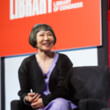Pigs in heaven: a novel
Description
More Details
9780061842214
9780060922535
9780062641465
Similar Titles From NoveList
Similar Authors From NoveList
Published Reviews
Publisher's Weekly Review
Taylor Greer and her adopted Cherokee daughter Turtle, first met in The Bean Trees , will captivate readers anew in Kingsolver's assured and eloquent sequel, which mixes wit, wisdom and the expert skills of a born raconteur into a powerfully affecting narrative. Now six years old and still bearing psychological marks of the abuse that occured before she was rescued by Taylor, Turtle is discovered by formidable Indian lawyer Annawake Fourkiller, who insists that the child be returned to the Cherokee Nation. Taylor reacts by fleeing her Tucson home with Turtle to begin a precarious existence on the road; skirting the edge of poverty and despair, she eventually realizes that Turtle has become emotionally unmoored. In taking a fresh look at the Solomonic dilemma of choosing between two equally valid claims on a child's life, Kingsolver achieves the admirable feat of making the reader understand and sympathize with both sides of the controversy, as she contrasts Taylor's inalterable mother's love with Annawake's determination to save Turtle from the stigmatization she can expect from white society. The chronicle acquires depth and humor when Kingsolver integrates the story of Taylor's mother Alice, a woman who believes that the Greers are ``doomed to be a family with no men in it'' (that she is proven wrong adds a delicious element of romance to the story). Alice's resolve to help her daughter takes her into the heart of the Cherokee Nation and results in an astonishing but credible meshing of lives. In the end, both justice and compassion are served. Kingsolver's intelligent consideration of issues of family and culture--both in her evocation of Native American society and in her depiction of the plight of a single mother--brims with insight and empathy. Every page of this beautifully controlled narrative offers prose shimmering with imagery and honed to simple lyric intensity. In short, the delights of superior fiction can be experienced here. 100,000 first printing; $125,000 ad/promo; BOMC alternate; author tour. (June) (c) Copyright PWxyz, LLC. All rights reserved
School Library Journal Review
YA-When a young Cherokee tribal lawyer comes to the door to claim Taylor's illegally adopted Indian daughter, the white woman must face the fact that her stable life is about to be torn apart. The story follows her and six-year-old Turtle across the West as they flee from the threat of separation and exist on minimum-wage earnings. Meanwhile, Taylor's mother, Alice, leaves her second husband and goes to stay with her cousin in Heaven, Oklahoma. There she meets Cash, a full-blooded Cherokee, who has been living outside the reservation, but yearns to return to his roots. The richness of Indian tribal life is seen through the eyes of Cash, Alice, and Annawake Fourkiller, the lawyer. There are some wonderful scenes revealing Cherokee customs and lifestyles. The stories of the different characters are woven together with humor and sensitivity. When Taylor and Turtle come to the reservation to face their future, readers will feel the adoptive mother's helplessness as she admits that she, too, might have let the child down. The characters are ordinary, yet noble and memorable, and the ending is just and gratifying. The issue of Indian children being adopted outside the tribe is addressed with respect from all sides.- Penny Stevens, Fairfax County Public Library, VA (c) Copyright 2010. Library Journals LLC, a wholly owned subsidiary of Media Source, Inc. No redistribution permitted.
Library Journal Review
In movieland, the trend toward seemingly endless sequels might make one weary; yet with books like Kingsolver's Pigs in Heaven, one can joyfully seize the sequel to The Bean Trees (LJ 2/1/88) and the continuing tale of Taylor Greer and her adopted Cherokee daughter, Turtle. Unsought fame leads mother and daughter to appear on Oprah and threatens to break up the small but sturdy family when a Cherokee attorney probes Turtle's apparently illegal adoption. Kingsolver's story bounces entertainingly from Native American legend to slightly offbeat wisdom to pop culture satire while seriously exploring the conflicts between the needs and rights of the individual and those of the tribe. The characters make one truly glad for the return visit. Recommended for most collections. [For a review of the abridged version of Pigs in Heaven, see Audio Reviews, LJ 7/93.-Ed.)-Joyce Kessel, Villa Maria Coll., Buffalo, N.Y. (c) Copyright 2010. Library Journals LLC, a wholly owned subsidiary of Media Source, Inc. No redistribution permitted.
Kirkus Book Review
For what's hoped to be a ``break-out book,'' a greatly gifted storyteller returns to the characters and settings of her celebrated first novel (The Bean Trees, 1987). Kingsolver previously tracked plucky ex-Kentuckian Taylor Greer as she made her way west to Tucson, struggling to earn a living and to deal with the frightened, wounded toddler Turtle, who had been abandoned in Taylor's care in Oklahoma. Now it's three years later. Settled Tucsoners Taylor and Turtle are on vacation at the Hoover Dam when six-year-old Turtle witnesses an accident--a retarded man has fallen into a spillway. When the man is rescued, Turtle becomes a celebrity--which brings self-confidence but also the attention of Cherokee Nation authorities in Heaven, Oklahoma- -especially that of Indian-activist lawyer Annawake Fourkiller, who recognizes Turtle as a missing Cherokee child called Lacey Stillwater; Lacey, it turns out, is the daughter of a deceased Cherokee woman whose alcoholic sister's abusive boyfriend broke both of Turtle's arms before the sister and boyfriend ditched her and disappeared. When Fourkiller pays an ominous visit to Taylor, whose adoption of Turtle may have been illegal, Taylor packs up the child and goes on the lam. As their flight becomes more punishing, Turtle regresses severely. Meanwhile, Taylor's spirited mother Alice Greer, remembering she has a Cherokee cousin in the town of Heaven, pays a visit, snoops around, and falls in love--with Cash Stillwater, Lacey/Turtle's grandfather and only living relative. Soon Taylor (no mother, not even those in the Indian myth of the odd title, is more loving) shows up to spare Turtle the trials of flight. All will be amicably, hilariously, and heartwarmingly settled to everybody's satisfaction. Not the truly wonderful book it might have been--characters who seem important disappear; carefully marked trails turn out to be merely picaresque, leading nowhere--but a terrific read nonetheless. (First printing of 100,000)
Library Journal Reviews
It takes an insightful writer like Kingsolver ( Animal Dreams , LJ 8/1/90) to tackle the complicated, emotional issue of dysfunctional families, but she does it well (again), making this development of characters first introduced in The Bean Trees ( LJ 2/1/88) as enjoyable to read as its predecessor--and better. Taylor Greer and her kindergarten-aged adopted daughter, Turtle, unwittingly place themselves at the center of a controversy involving Turtle's Native American heritage. Their love for each other--an unspoken, unquestioning bond--helps them cope with family, friends, and lovers as they try to tie the loose ends of their lives into a strong, tidy knot. Maybe this novel will help readers understand the meaning of life or simply provide them with some good entertainment. But as Kingsolver brilliantly reveals from the first pages of this novel, the answers to our questions aren't delivered easily but must come from the heart. Recommended for all general collections. Previewed in Prepub Alert, LJ 2/15/93.-- Marlene McCormack-Lee, Reedsport Branch Lib., Ore . Copyright 1993 Cahners Business Information.
Publishers Weekly Reviews
Taylor Greer and her adopted Cherokee daughter Turtle, first met in The Bean Trees , will captivate readers anew in Kingsolver's assured and eloquent sequel, which mixes wit, wisdom and the expert skills of a born raconteur into a powerfully affecting narrative. Now six years old and still bearing psychological marks of the abuse that occured before she was rescued by Taylor, Turtle is discovered by formidable Indian lawyer Annawake Fourkiller, who insists that the child be returned to the Cherokee Nation. Taylor reacts by fleeing her Tucson home with Turtle to begin a precarious existence on the road; skirting the edge of poverty and despair, she eventually realizes that Turtle has become emotionally unmoored. In taking a fresh look at the Solomonic dilemma of choosing between two equally valid claims on a child's life, Kingsolver achieves the admirable feat of making the reader understand and sympathize with both sides of the controversy, as she contrasts Taylor's inalterable mother's love with Annawake's determination to save Turtle from the stigmatization she can expect from white society. The chronicle acquires depth and humor when Kingsolver integrates the story of Taylor's mother Alice, a woman who believes that the Greers are ``doomed to be a family with no men in it'' (that she is proven wrong adds a delicious element of romance to the story). Alice's resolve to help her daughter takes her into the heart of the Cherokee Nation and results in an astonishing but credible meshing of lives. In the end, both justice and compassion are served. Kingsolver's intelligent consideration of issues of family and culture--both in her evocation of Native American society and in her depiction of the plight of a single mother--brims with insight and empathy. Every page of this beautifully controlled narrative offers prose shimmering with imagery and honed to simple lyric intensity. In short, the delights of superior fiction can be experienced here. 100,000 first printing; $125,000 ad/promo; BOMC alternate; author tour. (June) Copyright 1993 Cahners Business Information.
School Library Journal Reviews
YA-When a young Cherokee tribal lawyer comes to the door to claim Taylor's illegally adopted Indian daughter, the white woman must face the fact that her stable life is about to be torn apart. The story follows her and six-year-old Turtle across the West as they flee from the threat of separation and exist on minimum-wage earnings. Meanwhile, Taylor's mother, Alice, leaves her second husband and goes to stay with her cousin in Heaven, Oklahoma. There she meets Cash, a full-blooded Cherokee, who has been living outside the reservation, but yearns to return to his roots. The richness of Indian tribal life is seen through the eyes of Cash, Alice, and Annawake Fourkiller, the lawyer. There are some wonderful scenes revealing Cherokee customs and lifestyles. The stories of the different characters are woven together with humor and sensitivity. When Taylor and Turtle come to the reservation to face their future, readers will feel the adoptive mother's helplessness as she admits that she, too, might have let the child down. The characters are ordinary, yet noble and memorable, and the ending is just and gratifying. The issue of Indian children being adopted outside the tribe is addressed with respect from all sides.- Penny Stevens, Fairfax County Public Library, VA Copyright 1993 Cahners Business Information.







































